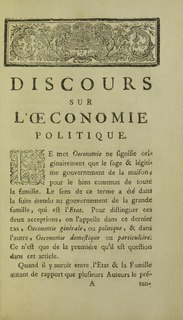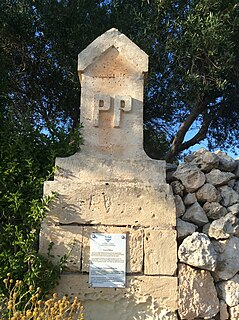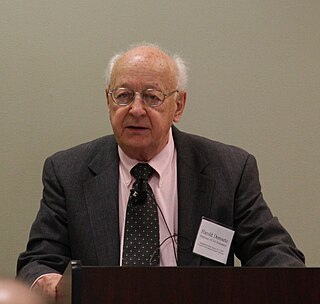
Political economy is the study of production and trade and their relations with law, custom and government; and with the distribution of national income and wealth. As a discipline, political economy originated in moral philosophy, in the 18th century, to explore the administration of states' wealth, with "political" signifying the Greek word polity and "economy" signifying the Greek word οἰκονομία. The earliest works of political economy are usually attributed to the British scholars Adam Smith, Thomas Malthus, and David Ricardo, although they were preceded by the work of the French physiocrats, such as François Quesnay (1694–1774) and Anne-Robert-Jacques Turgot (1727–1781).

Economic growth can be defined as the increase or improvement in the inflation-adjusted market value of the goods and services produced by an economy over time. Statisticians conventionally measure such growth as the percent rate of increase in real gross domestic product, or real GDP.
In economics and related disciplines, a transaction cost is a cost in making any economic trade when participating in a market. Oliver E. Williamson defines transaction costs as the costs of running an economic system of companies, and unlike production costs, decision-makers determine strategies of companies by measuring transaction costs and production costs. Transaction costs are the total costs of making a transaction, including the cost of planning, deciding, changing plans, resolving disputes, and after-sales. Therefore, the transaction cost is one of the most significant factors in business operation and management.

Private property is a legal designation for the ownership of property by non-governmental legal entities. Private property is distinguishable from public property, which is owned by a state entity, and from collective or cooperative property, which is owned by a group of non-governmental entities. The distinction between private and personal property varies depending on political philosophy, with socialist perspectives making a hard distinction between the two, while others blend the two together. As a legal concept, private property is defined and enforced by a country's political system.

Institutions, according to Samuel P. Huntington, are "stable, valued, recurring patterns of behavior". Institutions can refer to mechanisms which govern the behavior of a set of individuals within a given community, and are identified with a social purpose, transcending individuals and intentions by mediating the rules that govern living behavior. According to Geoffrey M. Hodgson, it is misleading to say that an institution is a form of behavior. Instead, Hodgson states that institutions are "integrated systems of rules that structure social interactions".
Law and economics or economic analysis of law is the application of economic theory to the analysis of law that began mostly with scholars from the Chicago school of economics. Economic concepts are used to explain the effects of laws, to assess which legal rules are economically efficient, and to predict which legal rules will be promulgated. There are two major branches of law and economics. The first branch is based on the application of the methods and theories of neoclassical economics to the positive and normative analysis of the law. The second branch focuses on an institutional analysis of law and legal institutions, with a broader focus on economic, political, and social outcomes. This second branch of law and economics thus overlaps more with work on political institutions and governance institutions more generally.
In law and economics, the Coase theorem describes the economic efficiency of an economic allocation or outcome in the presence of externalities. The theorem states that if trade in an externality is possible and there are sufficiently low transaction costs, bargaining will lead to a Pareto efficient outcome regardless of the initial allocation of property. In practice, obstacles to bargaining or poorly defined property rights can prevent Coasean bargaining. This 'theorem' is commonly attributed to Nobel Prize winner Ronald Coase.

Douglass Cecil North was an American economist known for his work in economic history. He was the co-recipient of the 1993 Nobel Memorial Prize in Economic Sciences. In the words of the Nobel Committee, North and Fogel "renewed research in economic history by applying economic theory and quantitative methods in order to explain economic and institutional change."
New institutionalism or neo-institutionalism is an approach to the study of institutions that focuses on the constraining and enabling effects of formal and informal rules on the behavior of individuals and groups. New institutionalism traditionally encompasses three strands: Sociological institutionalism, Rational choice institutionalism, and Historical institutionalism. New institutionalism originated in work by sociologist John Meyer published in 1977.
Institutional economics focuses on understanding the role of the evolutionary process and the role of institutions in shaping economic behavior. Its original focus lay in Thorstein Veblen's instinct-oriented dichotomy between technology on the one side and the "ceremonial" sphere of society on the other. Its name and core elements trace back to a 1919 American Economic Review article by Walton H. Hamilton. Institutional economics emphasizes a broader study of institutions and views markets as a result of the complex interaction of these various institutions. The earlier tradition continues today as a leading heterodox approach to economics.
The legal origins theory claims that the two main legal traditions or origins, civil law and common law, crucially shape lawmaking and dispute adjudication and have not been reformed after the initial exogenous transplantation by Europeans. Therefore, they affect economic outcomes to date. According to the evidence reported by the initial proponents of such a theory, countries that received civil law would display today less secure investor rights, stricter regulation, and more inefficient governments and courts than those that inherited common law. These differences would reflect both a stronger historical emphasis of common law on private ordering and the higher adaptability of judge-made law.
Avner Greif is an economics professor at Stanford University, Stanford, California. He holds a chaired professorship as Bowman Family Professor in the Humanities and Sciences.
New institutional economics (NIE) is an economic perspective that attempts to extend economics by focusing on the institutions that underlie economic activity and with analysis beyond earlier institutional economics and neoclassical economics. Unlike neoclassical economics, it also considers the role of culture and classical political economy in economic development.

Harold Demsetz was an American professor of economics at the University of California at Los Angeles (UCLA).
Law and development is an interdisciplinary study of law and economic and social development. It examines the relation between law and development and analyzes how to use law as an instrument to promote economic and social development.
Property rights are constructs in economics for determining how a resource or economic good is used and owned. Resources can be owned by individuals, associations, collectives, or governments. Property rights can be viewed as an attribute of an economic good. This attribute has three broad components and is often referred to as a bundle of rights in the United States:
- the right to use the good
- the right to earn income from the good
- the right to transfer the good to others, alter it, abandon it, or destroy it
Armin von Bogdandy is a German legal scholar. He is director of the Max Planck Institute for Comparative Public Law and International Law in Heidelberg and Professor for Public Law, European Law, and International and Economic Law at the Goethe University Frankfurt. Armin von Bogdandy's research centers on the structural changes affecting public law, be they theoretical, doctrinal, or practical.
The social sciences are the sciences concerned with societies, human behaviour, and social relationships.
Institutional complementarity refers to situations of interdependence among institutions. This concept is frequently used to explain the degree of institutional diversity that can be observed across and within socio-economic systems, and its consequences on economic performance. In particular, the concept of institutional complementarity has been used to illustrate why institutions are resistant to change and why introducing new institutions into a system often leads to unintended, sometimes suboptimal, consequences.
The credibility thesis is a proposed heterodox theoretical framework for understanding how societal institutions or social rules come about and evolve. It posits that institutions emerge from intentional institution-building but never in the originally intended form. Instead, institutional development is endogenous and spontaneously ordered and institutional persistence can be explained by their credibility, which is provided by the function that particular institutions serve rather than their theoretical or ideological form. The credibility thesis can be applied to explain, for example, why purported institutional improvements do not take hold as part of structural adjustment programs, while other economies in the developing world deliver growth despite absence of clear and strong market mechanisms such as indisputable private property rights or clearly delineated and registered land tenure. The thesis has been applied to explain the failure and success of institutional reforms for various sectors and property rights, including but not limited to, land, housing, informal housing and slums, natural resources, climate change policy and environmental policy.





